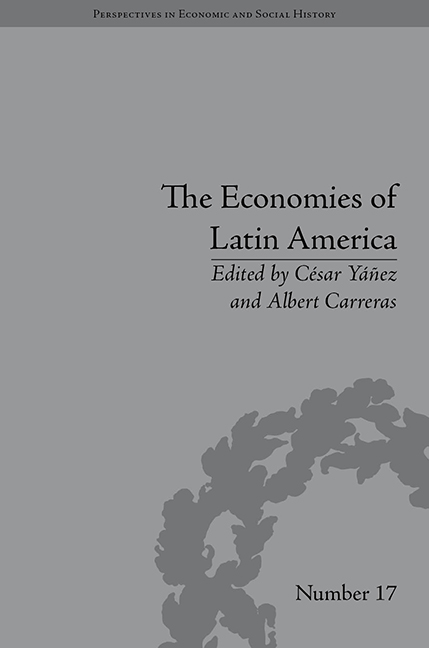Book contents
- Frontmatter
- CONTENTS
- List of Figures and Tables
- List of Contributors
- Preface
- Introduction: Latin American Economic Backwardness Revisited
- 1 Expectations, Institutions and Economic Performance: Latin America and the Western European Periphery during the Twentieth Century
- 2 On the Accuracy of Latin American Trade Statistics: A Non-Parametric Test for 1925
- 3 Latin America and Its Main Trade Partners, 1860–1930: Did the First World War Affect Geographical Patterns?
- 4 The Structure of Latin American Investment in Equipment Goods during the Mature Period of the First Globalization
- 5 Factorial Distribution of Income in Latin America, 1950–2000: New Series from the National Account Data
- 6 The Influence of the First World War on the Economies of Central America, 1900–29: An Analysis From a Foreign Trade Perspective
- 7 Economic Modernization in Adverse Institutional Environments: The Cases of Cuba and Chile
- 8 Capital Goods Imports, Machinery Investment and Economic Development in the Long Run: The Case of Chile
- 9 The Sugar Industry, the Forests and the Cuban Energy Transition, from the Eighteenth Century to the Mid-Twentieth Century
- 10 Empirical Debate on Terms Of Trade and the Double Factorial Terms of Trade of Colombia, 1975–2006
- 11 Public Revenues in Bolivia, 1900–31
- 12 The Consumption of Durable Goods in Latin America, 1890–1913: Analysis and Estimation of a Demand Function
- Notes
- Index
Preface
- Frontmatter
- CONTENTS
- List of Figures and Tables
- List of Contributors
- Preface
- Introduction: Latin American Economic Backwardness Revisited
- 1 Expectations, Institutions and Economic Performance: Latin America and the Western European Periphery during the Twentieth Century
- 2 On the Accuracy of Latin American Trade Statistics: A Non-Parametric Test for 1925
- 3 Latin America and Its Main Trade Partners, 1860–1930: Did the First World War Affect Geographical Patterns?
- 4 The Structure of Latin American Investment in Equipment Goods during the Mature Period of the First Globalization
- 5 Factorial Distribution of Income in Latin America, 1950–2000: New Series from the National Account Data
- 6 The Influence of the First World War on the Economies of Central America, 1900–29: An Analysis From a Foreign Trade Perspective
- 7 Economic Modernization in Adverse Institutional Environments: The Cases of Cuba and Chile
- 8 Capital Goods Imports, Machinery Investment and Economic Development in the Long Run: The Case of Chile
- 9 The Sugar Industry, the Forests and the Cuban Energy Transition, from the Eighteenth Century to the Mid-Twentieth Century
- 10 Empirical Debate on Terms Of Trade and the Double Factorial Terms of Trade of Colombia, 1975–2006
- 11 Public Revenues in Bolivia, 1900–31
- 12 The Consumption of Durable Goods in Latin America, 1890–1913: Analysis and Estimation of a Demand Function
- Notes
- Index
Summary
One decade into the twenty-first century, and thirty years since the worst economic crisis in Latin America (the debt crisis of the 1980s – ‘the lost decade’), it is time to have another look at the economic history of Latin America and the Caribbean from a long-term perspective. We firmly believe that many of the ideas used to study Latin American backwardness, are twentieth-century rather than twenty-first-century ideas. In this sense, Latin American economic historiography has been marked by a period of pessimism about Latin America's chances of overcoming economic backwardness. The tendency to take a short term perspective or to focus only on a few national cases has meant that research has been heavily influenced by debates centring on the failure of industrialization, the political cost of the military dictatorships, the social and economic impact of the ‘lost decade’ and the limitations of the subsequent recovery. The poor performance of Latin American economies in recent times has also influenced those who study the earlier stages, which helps to understand the success of a book entitled ‘How Latin America Fell Behind’ published in 1997.
This backwardness is apparent in the widening gap between GDP per inhabitant in Latin America and the Caribbean and that of wealthy countries. The ideas most frequently used in an attempt to explain Latin American backwardness point to institutional reasons, on the one hand, and the theory of ‘the curse of natural resources’, on the other, or to both simultaneously.
- Type
- Chapter
- Information
- The Economies of Latin AmericaNew Cliometric Data, pp. 1 - 6Publisher: Pickering & ChattoFirst published in: 2014



